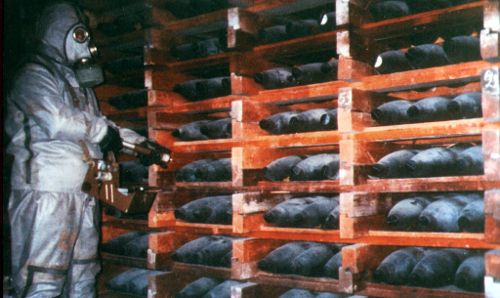What are chemical weapons?
- “The term
chemical weapon is applied to any toxic chemical or its precursor that can
cause death, injury, temporary incapacitation or sensory irritation
through its chemical action.”
- Chemical
weapons are classified according to how they affect human
beings:


1.
Choking agents like chlorine gas make
breathing difficult.
2.
Blister agents like mustard gas can
cause severe skin and eye irritation.
3.
Arsenic- or cyanide-based blood agents
are often fast-acting and lethal.
4.
Nerve agents like sarin or VX disrupt
the nervous system.
There are also plenty of gray areas:
- Under the Chemical Weapons Convention, riot-control
agents such as tear gas are considered chemical weapons if they’re used during war — but not if they’re
used for law enforcement.
- And there are all sorts of technicalities over the use
of white phosphorus, an incendiary weapon that has
been used in recent years by both the United States and Israel.
- The taboo
against chemical weapons is more than a century old.
- “The primary
idea is that they are indiscriminate and an inherent threat to civilian
populations,”
- “The kernel of
that really arose in the aftermath of World War I.
- Chemical weapons
were used on a wide scale in that conflict.
- There was a real
fear, particularly as air technology got better, that there’d be massive
chemical attacks on cities.”
- Now, granted,
regular bombs can be deadly and indiscriminate too.
- But for a
variety of historical reasons, a set of international norms developed
around chemical weapons that never developed around conventional
explosives.
- By World War II,
most countries had voluntarily ruled out the use of chemical warfare on
the battlefield.
Are chemical weapons banned under
international law?
- Yes.
- The 1925
Geneva protocol first prohibited the use of poisonous gas as a weapon
of war.
- The
1993 Chemical Weapons Convention then went even further
and outlawed the production, stockpile, transfer and use
of chemical weapons.
- Countries that
ratified the treaty pledged to destroy their existing stockpiles.
Not everyone has signed
that 1993 treaty, however. Syria, North Korea, Egypt and Angola are notable
omissions. Israel and Burma, meanwhile, have signed the treaty but not ratified
it:
Which countries currently possess chemical
weapons?
- At
least five countries still have officially declared stockpiles: The United States, Russia, Libya, Iraq, and
Japan (the latter’s weapons
were left in China after World War II).
- These
nations have all pledged to destroy their remaining stocks, but progress
has been slow: As of July 2013, there are still more than 13,000
tons of chemical agents left.
That’s not all, though.
The U.S. intelligence community believes that Syria, Iran, and North
Korea all have their own covert chemical arsenals. Syria, in particular, “maintains a stockpile of numerous chemical
agents, including mustard, sarin, and VX.”
- There are
also a number of other countries that may have
chemical weapons or the facilities for producing them, but public information
is murky.
- The
list of possible suspects includes: Burma,
Egypt, Pakistan, Serbia, Sudan, Taiwan and Vietnam.
Which countries have used chemical weapons?
- During the Yemen
civil war of 1963-1967, Egypt used mustard gas, phosgene, and
tear gas against royalist forces.
- And in 1987,
Libya allegedly used chemical weapons against Chadian troops.

- The most
notorious recent incidents have come in Iraq.
- Saddam Hussein
used various gases on a wide scale in his war against Iran and then later
in his campaign against Iraq’s Kurds in the late 1980s.
- His general in
that effort, Ali Hassan al-Majid, was given the nickname “Chemical Ali”.
Did Iraq get punished for
using chemical weapons?
- After the Iran-Iraq war, there was no response. All the U.N. could muster was a weakly worded condemnation of chemical weapons that didn’t name names. And the U.S. was in no rush to see Iraq punished, as they didn’t want to see Iran win.
- Later on, however, the U.N. Security Council did pass a number of resolutions to disarm Saddam Hussein. And, in 1998, the U.S. launched Operation Desert Fox, a four-day bombing campaign intended to “degrade” Iraq’s weapons capabilities — chemical, biological, and nuclear — after Hussein kicked out U.N. inspectors.
Focus ---- >>>
SYRIA

- The Syrian government is thought to possess large stocks of nerve agents (sarin and VX)as well as mustard gas, likely weaponized into bombs, shells and missiles.
- It also may have some production facilities.
- Syria “probably”
first began stockpiling chemical weapons in 1972 or 1973, when Egypt gave
the country a small number of chemicals and delivery systems before
the Yom Kippur War against Israel.
- The Soviet Union
later supplied chemical agents, delivery systems and training. Syria is
also “likely to have procured equipment and precursor chemicals from
private companies in Western Europe.”
- According to the
report, Syria doesn’t yet appear to have the capacity to produce the
weapons entirely on its own, relying on outside help for precursors.
